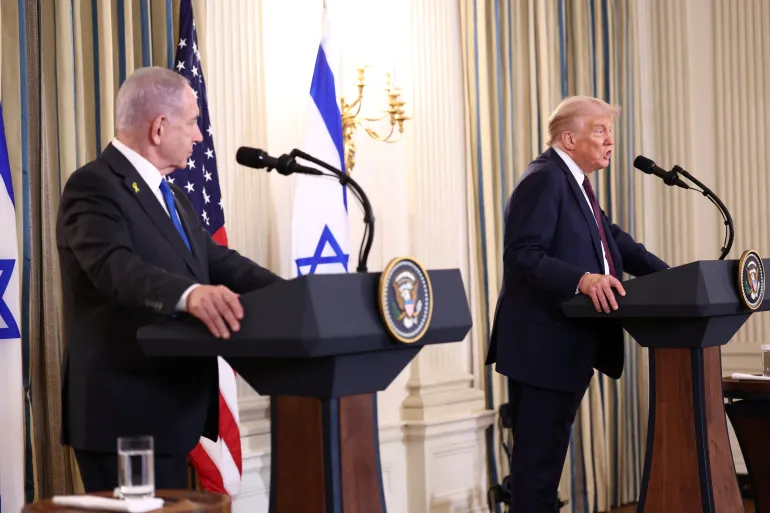
Trump: Gaza Stabilisation Force Expected ‘Very Soon’
United States President Donald Trump has said that an international stabilisation force, coordinated by Washington, is expected to be deployed in the Gaza Strip “very soon” as part of his administration’s post-war peace plan.
Speaking at a press briefing on Thursday, Trump said an alliance of “very powerful countries” had agreed to contribute to the peacekeeping mission, designed to restore order and stability to the war-ravaged Palestinian enclave.
“It’s going to be very soon. And Gaza is working out very well,” Trump said, adding that the coalition would intervene if there were renewed hostilities involving Hamas, which has not yet confirmed plans to disarm.
The announcement comes as Gaza remains gripped by a severe humanitarian crisis, with ongoing Israeli air raids, limited aid access, and hundreds of thousands of displaced civilians struggling to survive amid the ruins.
UN Security Council to Debate Peacekeeping Resolution
Trump’s comments align with ongoing United Nations Security Council (UNSC) preparations to debate a two-year mandate for the transitional governance body and the multinational stabilisation force.
According to diplomatic sources, the proposed force would be tasked with protecting civilians, securing Gaza’s borders, and training local Palestinian police to maintain order.
UN Secretary-General Antonio Guterres told Al Jazeera that any such deployment must have “full international legitimacy” to ensure long-term peace and protection for Gaza’s population.
A senior US official confirmed to Reuters that negotiations were scheduled to begin on Thursday, after the United States circulated a draft resolution to UNSC members and key regional states, including Egypt, Qatar, the UAE, Saudi Arabia, and Turkiye.
The resolution reportedly allows for the deployment of up to 20,000 troops empowered to “use all necessary measures” to fulfil their mandate — including the use of military force if required.
Israel Opposes Turkish Involvement in Gaza Peacekeeping Force
While Turkiye played a major diplomatic role in promoting Trump’s 20-point Gaza peace plan, Israeli officials remain adamantly opposed to Turkish involvement in the international force.
Turkish Foreign Minister Hakan Fidan hosted counterparts from Qatar, Saudi Arabia, the UAE, Jordan, Pakistan, and Indonesia in Istanbul earlier this week to rally support for the mission and call for Israel to uphold the ceasefire.
Turkiye has consistently denounced what it calls “Israel’s genocidal war” in Gaza and urged an end to restrictions on humanitarian aid.
However, Israeli Prime Minister Benjamin Netanyahu and Foreign Minister Gideon Saar have made clear that “no Turkish troops” will be accepted on Gazan soil.
During a joint news conference with Trump in September, Netanyahu reiterated Israel’s position:
“Israel will retain security responsibility, including a security perimeter, for the foreseeable future.”
Background: Trump’s 20-Point Peace Plan for Gaza
Trump’s 20-point peace plan, unveiled earlier this year, has been credited with helping broker a ceasefire agreement and facilitating prisoner exchanges between Israel and Hamas on October 10.
The plan envisions a phased process that includes:
- Disarmament of armed factions in Gaza.
- Deployment of an international stabilisation force under US coordination.
- Reconstruction of Gaza’s infrastructure through an international donor conference.
- Formation of a transitional Palestinian authority supported by Arab and Western states.
However, the ceasefire remains fragile, with Israel accused of repeatedly violating it through continued airstrikes and border blockades.
US Role and Military Clarifications
While the United States is coordinating the international mission, military officials have emphasized that no American troops will be deployed in Gaza.
The head of the US Central Command (CENTCOM), responsible for military operations across the Middle East, confirmed last month that American personnel will provide logistical, intelligence, and aerial support, but not direct involvement on the ground.
Analysts say the deployment of a multinational force would mark the first major international intervention in Gaza in decades, potentially reshaping regional security dynamics.
Humanitarian Situation in Gaza Remains Dire
Despite the announced ceasefire and diplomatic efforts, the humanitarian situation in Gaza continues to deteriorate.
The United Nations reports that over 70 percent of Gaza’s population remains displaced, with food shortages, medical collapse, and infrastructure destruction crippling civilian life.
Humanitarian agencies warn that without safe corridors for aid and international protection, any peacekeeping mission could struggle to stabilise the situation.
Key Takeaways: Gaza Stabilisation Efforts (November 2025)
- Trump confirms peacekeeping deployment “very soon.”
- 20,000-troop multinational force proposed under UN mandate.
- Israel rejects Turkish participation in any Gaza operation.
- Hamas yet to confirm disarmament under Trump’s plan.
- Ceasefire remains fragile amid ongoing Israeli bombardments.
Conclusion: Fragile Hopes for Peace in Gaza
As global powers prepare to debate the logistics of deploying an international stabilisation force, the people of Gaza continue to bear the brunt of conflict and displacement.
Whether Trump’s peace plan and the UN-backed mission can restore peace — or further complicate the region’s already fragile balance — remains uncertain.
For now, the world watches as diplomatic negotiations unfold, hoping that a new chapter of security and recovery can finally begin in Gaza.


Leave a Reply